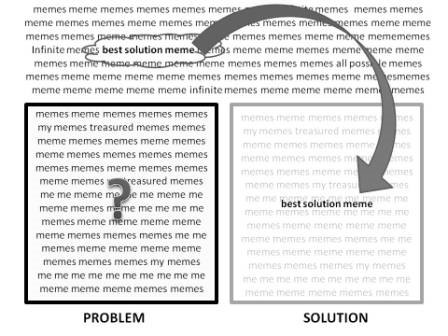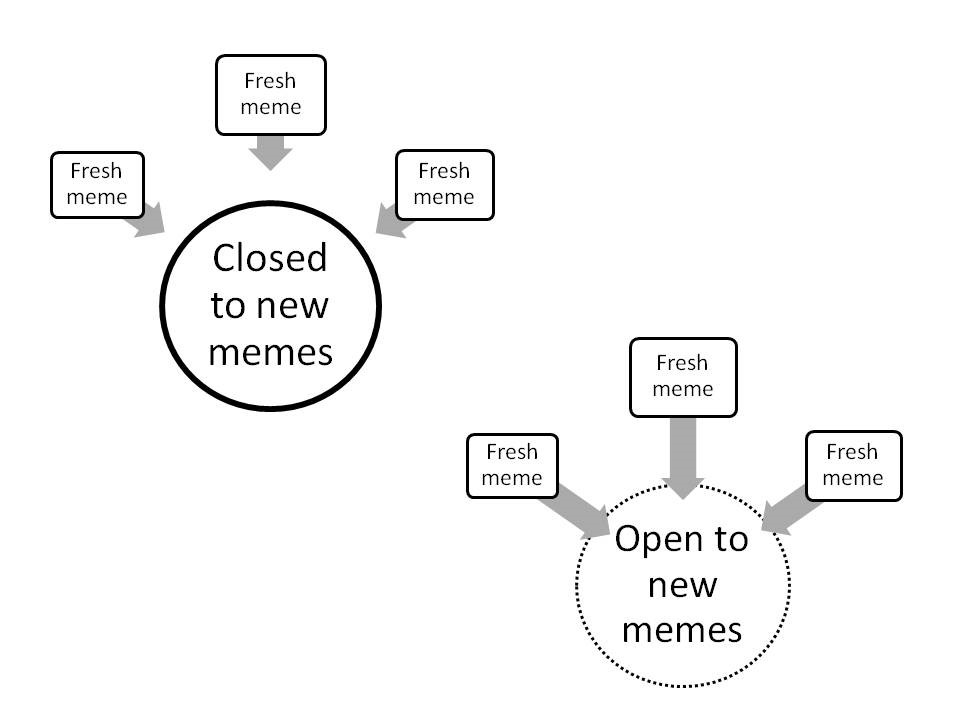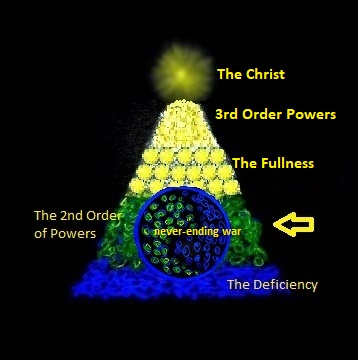Gnostic Insights

What Is Your Worldview?
Today we’re going to talk again about worldviews, ideologies, and memes. And the way I use the word meme is to represent an idea, a tidbit, a small piece of information. It was actually Richard Dawkins, of all people, that coined the term meme, and he used it as an analogous term to the word gene—so a meme is to worldviews and ideologies as a gene is to your DNA makeup. And your DNA is made up of genes, just as our ideologies are made up of countless memes. So I’m going to explain a little bit about what a meme is and what their effect is on our worldview.
Do you know what your worldview is? What is your worldview? Have you thought about it? If you were king of the world, what would you have other people believe? What would be the consequences? If everyone believed what you believe, what would that world look like? Here at Gnostic Insights, I’m promoting a type of Gnosticism that comes from the Tripartite Tractate of the Nag Hammadi, primarily, as a type of worldview, a type of ideology that would help everyone to get along, that would make this world a better place. It’s not just about our afterlife or what came before the Fall. It’s about: how do we live our lives now?
So I’m going to give you some fresh information at the beginning of this episode, but then I’m going to kick back into an excerpt from a previously recorded episode concerning ideologies and worldviews. In 2018, I posted an article called Apocalyptic Visions on my Simple Explanation blog, and if you go to the Gnostic Insights homepage, gnosticinsights.com, I’ll be putting hypertextual links to that original article in this transcript. That first article, Apocalyptic Visions, was about the role of free speech in a representative republic, or what we usually refer to as a democracy.
The system of government that the United States has been operating on is ideally run with what is called the consent of the people. That is, you agree with what your government is doing. The populace elects representatives who promise to bring the wishes of the people to their state house or to Congress, and to fairly represent those wishes.
These representatives promise to vote in a manner that upholds the will of all the people in their district that they are representing. This is in stark contrast with a government ruled by a small group of elites who consider themselves superior to the populace, and therefore endowed with the ability to make better decisions than the people can make for themselves. These ruling elites do not care for the wishes of the people, and they do not feel bound to represent their constituents.
In the kindest terms, this would be called a nanny state, because the people are being told what to do for their own good, like a nanny tells little children. In harsher terms, this ruling elite is called authoritarianism or fascism. In that case, the people may be told it’s for their own good, but really, it’s for the good of the ruling elite, which is usually a combination of extremely wealthy industrialists who make money from the legislation they enforce, and ideological fanatics who apparently believe in the agenda they impose upon the masses, again, “for their own good,” despite the negative outcomes their decisions may bring.
There’s an old saying that power corrupts, and absolute power corrupts absolutely. We also hear the expression, follow the money, in order to figure out who is actually in control. The ones who are in control are both those who profit financially at the expense of others, and those who gain more control over the population as an outcome of their decisions.
So, when we find ourselves scratching our heads and wondering what on earth is happening, we can look around at exactly who is profiting by the decisions being enacted, both in power and control, and with money, big money. Figuring out who holds the power and who is making the money is key to figuring out what kind of government you have in control. And then look at the promises that are being made by those in control “for your own good” and “for the good of the planet,” and see how those promises are concentrating money and power in certain industries and rulers’ hands.
In order to concentrate power in the hands of the rulers and the elites, it is necessary to shut down freedom of speech and freedom of thought. With the rise of social media and the concentration of mainstream media into the hands of a few powerful elites, freedom of thought may now be easily controlled by controlling the information that is allowed to get out. We call that sort of information control propaganda because only the officially endorsed information is allowed to be disseminated.
The Tripartite Tractate speaks a lot about power and the roots of power. The following quote sums it up pretty well:
“The thought of the archons is not barren. All that they thought about they have as potential offspring. Fighters, warriors, troublemakers, apostates, disobedient beings, lovers of power.” (Tripartite Tractate, verse 79)
Now I’m going to replay a portion of an episode from May of 2021 because I believe the message is needed now more than ever.
What is and isn’t allowed in the minds of members is determined by which memes are included and which are excluded from the group’s ideological meme chord. Because of this, information exchanged between members of different cultures will resonate more strongly with the sender’s memes than with the receiver’s memes. For example, when an American speaks of free and democratic elections, his or her mimetic definitions for free and democratic may differ radically from another culture. The extent to which communication may occur between cultures is determined by their overlapping memes and the permeability of each culture’s deterministic screens and the extent to which they are open to foreign memes.
Another example of delimiting memes occurs during problem solving. The more tightly held one’s memes are, the fewer solutions will present themselves. If you think only a hammer will drive a nail, you will not even consider the flat side of the heavy wrench lying nearby.

If a group thinks outsiders are untrustworthy, then they will not trust any outsider. The ability to consider solutions outside the box and to engage in lateral thinking comes about through non-attachment to the shoulds and oughts of how things work. One must be willing to set aside treasured beliefs in order to perceive memes outside one’s own bundle and thereby discover fresh solutions.
In the same manner that a person’s personality is defined by its unique meme bundle, institutions are also defined by their sets of treasured memes. Memes are even more important to an institution than are its members in the sense that members come and go, but memes persist. As President John F. Kennedy put it, “people may die, nations may rise and fall, but an idea lives on.”
Each and every cultural institution we belong to—family, workplace, church, mosque, tribe, nation, and so on—not only comes with its own bundle of shared memes held in common by its members, it also comes with a filter that limits members from acknowledging or adopting ideologically incompatible memes (this filter is called a terministic screen). Institutions are defined as much by their excluded memes as they are by their included memes.

An exclusive institution holds tightly to the identity provided by its current memes. Its border is strong and its filter is powerful. An inclusive institution allows members more latitude in the memes they may hold. Its border is less defended, its filter less opaque.
An open-minded institution allows that there may be memes out there in the larger culture of value. Its filter is more permeable. In the United States, for example, and I believe it’s worldwide at this point, progressive institutions are no longer inclusive. They talk as though they’re inclusive, they talk as though they accept diversity of thought and behavior, but actually they only currently accept their particular view, so they are no longer actually progressive and inclusive. They are as tightly conservative as any conservative group has traditionally been, but they’re still calling themselves progressive. Here is a statement from President John F. Kennedy that expresses the traditional view of progressivism:
“We are not afraid to entrust the American people with unpleasant facts, foreign ideas, alien philosophies, and competitive values. For a nation that is afraid to let its people judge the truth and falsehood in an open market is a nation that is afraid of its people. What is objectionable, what is dangerous, about extremists, is not that they are extreme, but that they are intolerant. The evil is not what they say about their cause, but what they say about their opponents.”
And so, the current state of progressivism still talks the good talk about inclusion and diversity, but what they say about their opponents is hateful and divisive. The current progressive meme of identity politics separates and segregates in contrast to the progressive meme of John F. Kennedy that unites and integrates.
We like people who share the same memes we do. The more memes people have in common, the more they agree with one another, and the more they like and respect the other person. Friends have a lot of memes in common. Co-religionists share the same religious meme chords. Tribal brothers and sisters share tribal memes. Citizens share their nation’s meme chords. Subcultures share their subcultural memes.
What happens when meme chords collide? What happens when the memes I believe in and hold onto contradict the memes you hold dear? Herein lies the source of all human conflict. In Gnosticism, we call this the endless war. The disagreements, the fights, the wars are all conflicts over incompatible memes. I may believe that my memes are vastly superior to yours. Does that mean I should kill you? Well, that’s a ridiculous idea.
Oh, but what if I strongly believe my memes are the best? Does that mean you have to believe every meme I believe or else I’m going to burn your house down and loot your business? Well, that’s pretty absurd. Yeah, but what if I know in my heart that my memes are so much better than your memes? Does that mean you are stupid or systemically racist? Does that mean you are a fraud? Does that mean you just don’t get it? Maybe. Maybe not.
Most of our memes came embedded in larger meme chords handed down by others. Most of us have no idea what meme chords we hold and how we came to hold them. In any case, you can’t force someone else to adopt your memes any more than you can force someone else to adopt your gender or your skin color. It is an impossibility.
The Simple Explanation suggests that live and let live would be a great meta meme for everyone to adopt. If we could appreciate the fact that each of us has a unique perspective, then perhaps we could allow each other to hold the memes that make the most sense for our own lives. This is my meme chord. That is your meme chord. If I don’t like your meme chord, then I can talk it over with you and see if we can move our meme chords closer together in agreement. If neither of us is willing or able to swap memes with the other, then so be it. Either accept the other person, memes and all, or move on. Find someone else who more closely agrees with your memes. There is enough room in this world for each of us to hold our own chords, but only if live and let live is an overarching meme. Live and let live is the democratic ideal.
We now find ourselves in the midst of a social epidemic of intolerance. Intolerance is the opposite of live and let live. When we are intolerant of others’ memes, we are declaring that our memes are correct and their memes are wrong. And then we take it a step further. We refuse to tolerate the others’ memes. We throw up resistance. We throw up roadblocks. We close our ears and refuse to listen to the other. We do not merely disagree, as reasonable people may do from time to time.
When we are intolerant, we look for ways to force the other to abandon their memes and adopt ours. We shout them down because we feel we are shouting the right memes, and theirs are not only wrong, they are evil, and they have no right to be heard. And once you declare the other evil, it is no longer a disagreement in good faith, but a fight for the soul. God is on our side, therefore we can do whatever it takes to crush the opposition. That is a dangerous and usually delusional meme to hold. And if it entitles the holder to disregard rule of law, then it is not a democratic ideal, and it has no place in American politics.
Once words can no longer be exchanged, frustration builds and violence follows. This is what we are seeing now, because free exchange of memes has been thwarted through intolerance. Exchange of ideas is the key. You needn’t agree with the other person, but you must hear them out. Because once you agree to sit and exchange ideas and concerns, whether you adopt the other’s ideas or not, the very act of hearing each other creates a shared space that acts as a balm to soothe both your soul and theirs. When you are too angry, frustrated, or afraid to listen to the other, you perpetuate the intolerance that leads to violence. This intolerance is not helpful.
We hear a lot about the importance of diversity nowadays in America. True diversity can only thrive if we allow each other to live and let live. When you seek to silence those with whom you disagree, you are not encouraging diversity. You are actually partaking in, dare I say it, fascism. Because fascism advocates the forced suppression of those who express opposing views.
Disagreement, on the other hand, is not forced suppression. It is merely disagreement. Shouting others down when they have the floor, shunning those with whom you disagree, unfriending people on Facebook because they hold opposing views, refusing service in a restaurant to paying customers who voted for a different candidate—this does not help us come together to make things better for the common good.
In Gnostic terms, it is a violation of the Simple Golden Rule. It is a continuance of the never-ending war. It engages the second-order powers in endless war, chasing each other, like the ouroboros, which is the snake eating its own tail. It does not build, it merely enslaves.
 “An Ouroboros – a snake eating its own tail – carved on a Victorian gravestone in Glasgow’s Necropolis cemetery. “
“An Ouroboros – a snake eating its own tail – carved on a Victorian gravestone in Glasgow’s Necropolis cemetery. “And remember, positive change cannot come through hate. Hate is not the realm of the Fullness. Hate does not come from above. Hate is a result of the Fall. And when you’re in a fallen world, you’re in the never-ending war.
 We 2nd order powers are caught in a never ending war with the deficiency and each other
We 2nd order powers are caught in a never ending war with the deficiency and each otherSo if you are attempting to promote what you believe are good ideals, but you feel anger and hatred towards those that oppose you, then you’re not on the right path. Only the Fullness, only love, can bring about a good change in this world. Because love breaks the cycle, the vicious cycle, of the never-ending war.
So when you get riled up, and especially when you get riled up in anger, and most especially if your anger has gone on so long, or if you are believing what is being told to you by others and it makes you feel hatred to those who oppose you, then you’re on the wrong path.
Thank you for spending this time with me. Onward and upward, and God bless.
I would love to hear from you. I always respond to your questions and comments. I would love to dialogue with any of you that would like to talk this material over. Also, over at the Substack version of Gnostic Insights, called The Gnostic Reformation, I have enabled the Chat function where we can publicly message back and forth.
So thank you for spending this time with me and onward and upward. And God bless.
If you have found these Gnostic Insights helpful to your understanding, please contribute if you can so we can continue this effort of bringing gnosis to as many people as possible. I have stopped using the Paypal buttons and have switched podcast support to Donorbox going forward. Thank you! I appreciate you!!!






 Visit Podcast Website
Visit Podcast Website RSS Podcast Feed
RSS Podcast Feed Subscribe
Subscribe
 Add to MyCast
Add to MyCast